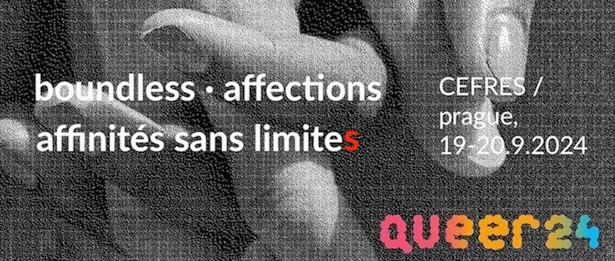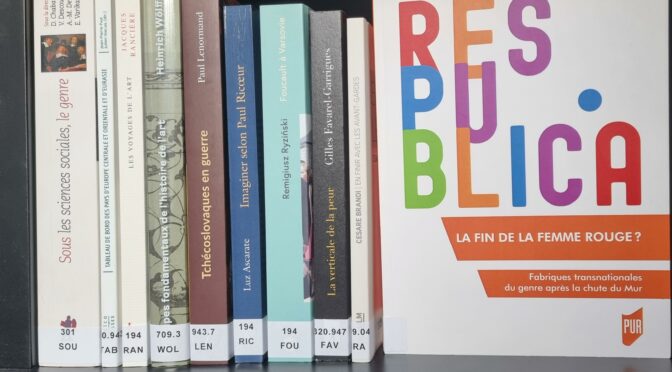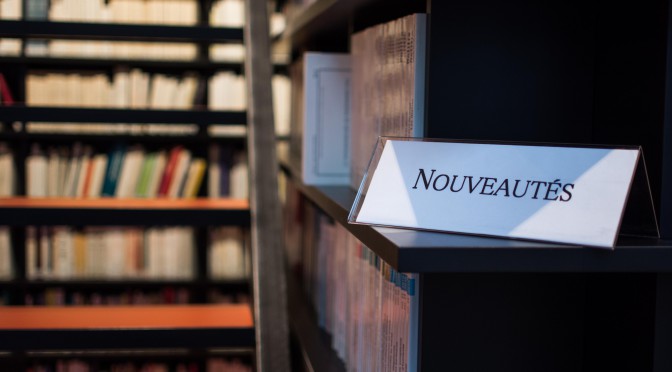City bez hranic: Metodologie pro komparativní historii literárního znázorňování stejnopohlavní touhy (19. – 20. století)
Tento mezinárodní workshop bude pojat jako přípravná akce pro vydání tematické publikace v rámci série ICLA Comparative History of Literatures in European Languages. Publikace ponese název Representing Same-Sex Desire. Local Contexts, Global Circulations in European Literary Cultures.
(CHLEL: https://www.uantwerpen.be/en/projects/chlel/).
Datum: 19. – 20. září 2024
Místo konání akce: CEFRES, Na Florenci 3, Praha 1 & online
Organizátoři:
- Mateusz Chmurski, Sorbonne-Université / CEFRES
- Clément Dessy, Université libre de Bruxelles
- Hélène Martinelli, École normale supérieure de Lyon / CEFRES
- Ana Isabel Simón-Alegre, Adelphi University
- Josef Šebek, Ústav české literatury a komparatistiky, Filosofická fakulta, Univerzita Karlova
Partneři:
- Koordinační rada pro sérii Srovnávací dějiny literatur v evropských jazycích, Mezinárodní asociace pro komparatistiku (CHLEL-ICLA)
- Národní fond pro výzkum (FNRS), Belgie
- Výzkumná centra STRIGES a Philixte, Université libre de Bruxelles (ULB), Belgie
- Adelphi University (New York), Spojené státy
- Francouzský ústav pro výzkum ve společenských vědách (CEFRES), Praha, České republika
- Ústav české literatury a komparatistiky, Univerzita Karlova (ÚČLK FF UK), Praha, České republika
Cílem tohoto publikačního projektu je obsáhnout komplexnost znázornění stejnopohlavní touhy v literárních dílech psaných evropskými jazyky. Publikace se zaměří na období od konce 19. století, kam se datují počátky modernistického hnutí a zároveň objevení prvních dobových definic homosexuality v různých evropských kontextech, až po konec 20. století, kdy šlo vypuknutí pandemie AIDS ruku v ruce s proměnou těchto znázornění. Poslední dekády minulého století představovaly v mnoha západních zemích období depenalizace a teoretických diskusí, odehrávajících se paralelně s otevřením nových sociálních a historických perspektiv, například ve studiích gayů a leseb, po nichž následoval další konceptuální obrat, jejž přinesl rozvoj genderových a queer studií.
Volba pozitivní definice stejnopohlavní touhy jako našeho východiska nám zabraňuje, abychom k otázce této touhy přistupovaly ze sociální, kulturní a literární perspektivy, která by byla založena výhradně na opozici vůči heteronormativitě. To nám umožňuje pozorovat různá lokální specifika a tendence v literárních znázorněních v nadnárodním a komparativním kontextu. Naším cílem je zkoumat možné diskrepance mezi různými tradicemi, stejně jako plodné dialogy mezi nimi, namísto toho, abychom nabízeli univerzalistický „coming-out” model lesbické, gay a queer literární historie předkládané jako progresivistický narativ.
Znázornění stejnopohlavní touhy budou chápána v „estetickém (mimésis) i politickém (reprezentování druhých) smyslu slova” (Couser 2016: 3). To nám umožní zaměřit se nejen na kolování forem a žánrů, textových formátů, děl a autorů a autorek, ale také na jejich potenciál identifikace. To nám zároveň pomůže určit vzorce jejich recepce v lokálním a mezinárodním oběhu, stejně jako jejich interakci se společenskými a politickými diskursy. Opozice vůči různým souborům norem, jejichž překračování se nakonec může do jisté míry stát normami samotnými, je zde součástí úvah navržených pro tuto publikaci.
V kontextu tohoto workshopu musí všechny analýzy přesahovat čistě národní rámec a zohledňovat rozmanitost a specifický kontext každé země a/nebo jazykové oblasti. Zaměříme se na diskusi o teoretických a metodologických otázkách komparativní literatury, jako jsou:
- (Dis)kontinuity: Jak můžeme porovnat historická znázornění stejnopohlavní touhy v evropských jazycích z hlediska kontinuit a proměn? Jak se přitom vyhnout esencializaci identit?
- Epistemologie: Jaké metody a pojmy již byly použity k analýze těchto znázornění napříč jazyky a literaturami? Existovaly studie věnované literárním znázorněním stejnopohlavní touhy již před 70. lety 20. století, která otevřela příležitost pro etablování oborů jako jsou gay, lesbická a queer studia?
- Kánon / pod-kánon(y): Jak souvisí vznik literatury zkoumající různé sexuální orientace a genderové identity s evropskými literárními tradicemi i s transkulturními/nadnárodními perspektivami? Lze v literatuře vypracovat komparativní historii pod-kánonu znázornění stejnopohlavní touhy?
- Žánr: Dokážeme vypozorovat, zde se v souvislosti se znázorněním stejnopohlavní touhy používá specifických žánrů, ať už v beletrii, literatuře faktu, dramatu, poezii atd.?
- Pohled/styl: Existuje gay/lesbický/queer pohled v literárních znázorněních stejnopohlavní touhy? Využívají tato znázornění určité tropy a zákonitosti autorské sebeprezentace, vyjednávání s (dominantními) normami atd. napříč texty a literaturami?
- (De)centrace: Jak můžeme rozpoznat rozdíly a podobnosti mezi periferními literárními směry (např. postimperiálním, postkoloniálním, postsocialistickým) v rámci různých sociálních, kulturních a politických kontextů poznamenaných útlakem ze strany autoritářských nebo náboženských mocenských struktur, zejména v jejich zobrazeních stejnopohlavní touhy?
- Kulturní přenosy a nacionalismy: Jak můžeme uvažovat o vztahu mezi nacionalismem a znázorněním stejnopohlavní touhy v literatuře a dalších médiích (např. národní stereotypy, strach z kosmopolitismu…)? Jakou roli hrály na národní a nadnárodní úrovni různé formy překladu a přisvojování textů znázorňujících stejnopohlavní touhu?
Chcete-li předložit návrh příspěvku, zašlete nám do 15. května 2024 následující informace:
a) Váš písemný návrh v angličtině, 250 až 300 slov, včetně vašeho jména, e-mailu a univerzity.
b) Stručný životopis v angličtině, v rozsahu 200 až 250 slov, pomocí poskytnutého formuláře Google: https://forms.gle/jb6oixDphUUVkKqNA.
Komise oznámí své rozhodnutí počínaje 30. květnem 2024.
Návrhy zaslané e-mailem nebudou přijímány. Může být poskytnuta částečná nebo úplná náhrada cestovních nákladů.
V případě jakýchkoli dotazů se obracejte na:
- Mateusz Chmurski, mateusz.chmurski@sorbonne-universite.fr
- Clément Dessy, clement.dessy@ulb.be
- Ana Isabel Simón-Alegre, aisimon@adelphi.edu
- Josef Šebek, Josef.Sebek@ff.cuni.cz







